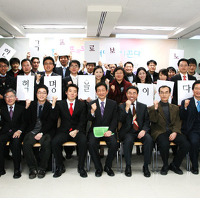
John Wood, a former Microsoft executive, quit his lucrative job position and became the founder and CEO of Room to Read, a non-profit charitable organization dedicated to building education infrastructure in underdeveloped and developing countries. He says that, while Starbucks set up about 500 coffee shops around the world over the past six years, his organization built up over 1,000 libraries in villages of Vietnam, Cambodia, the Republic of South Africa and many other countries to end the cycle of poverty. / Courtesy of Bookie
Beautiful Revolution of Social Enterprises for `Fair Globalization’
By Ryu Jin
Staff Reporter
Aurolab, a medical device manufacturer in India, sells its micro-mini hearing aids at a price range of $0-200. Usually, a deaf aid from other companies sells at around $1,500. Say the $200 price tag is understandable. But for free?
While Aurolab sells its high-quality products to some people at the price of $200 or less, the ``dubious’’ body distributes the devices free to others, who need them but cannot afford them.
``Get treatment according to needs; pay money according to ability?’’ some may ask. But the project, which reminds us of a Communist ideal, won an award from the World Bank in 2002 for its contribution to the market economy.
David Green, who initiated the project, has spearheaded the ``innovation’’ so that the company can both provide high-tech medical products to people who need them at lower prices and, at the same time, make money in the system of market economy.
He summarizes his project and business with the terms ``compassionate capitalism’’ and ``ethical globalization,’’ with which he argues the ideal could be harmonized with the reality.

Yoo Byung-sun’s new book ``Bonobo Revolution’’ tells the stories of ``social entrepreneurs’’ and ``social enterprises’’ that fill the cracks in this capitalized world of globalization.
Often dubbed the Pygmy Chimpanzee, the Bonobo is one of the two species making up the chimpanzee genus, Pan; the other species in genus Pan is Pan troglodytes, better known as the Common Chimpanzee.Contrary to the Common Chimpanzee, which is very competitive and sometimes shows extraordinary hostility and selfishness, the Bonobo has an optimistic attitude and prefers peace and sexual contact over violent confrontation.
Frans de Waal, a Dutch-American psychologist and one of the world’s prominent primatologists, said that the human genes have both the characteristics of the Common Chimpanzee and the Bonobo.
Yoo, who currently serves as an editorial writer for the Kyunghyang Daily, employs the contrast for the title of his book ``Bonobo Revolution.’’ So, the Bonobo could be understood as the slogan ``capitalism with a human face,’’ or a fairer globalization.
He introduces eight social entrepreneurs and seven social enterprises including John Wood, who set up Room to Read to build libraries in poor villages around the world, and Grameen Bank, which won the Nobel Peace Prize in 2006, to South Korean readers.
Social Entrepreneurship
Social enterprises have made contribution greatly to the society since the start of the new century. And this is fundamentally different from the corporate social responsibility (CSR) activities of private enterprises that have become popular here recently.
Generally, social enterprises are defined as organizations with social mission, which trade in goods or services for social purposes. While a social enterprise could be a non-profit organization, it could also be a profit-making entity.
So the social ecosystem, where the social enterprises exist, could be called the ``fourth sector’’ in addition to the three established sectors: the government (the first/public sector), business (the second/private sector) and civil society (the third/social sector).
Yoo, in the last two chapters, delves more deeply into the fourth sector such as the prerequisites for social entrepreneurship including creativity, business-minded nature, social influence of the ideas and moral character.
He gives an example ― a comparison of similar projects in South Korea and in the United States several years ago ― which shows the significance of the role of social entrepreneurs.
In 2006, about 300 Seoul National University students went into the hillside slums in the neighborhood to give some 1,000 children of deprived families out-of-school lectures. But the project, managed by the central government, local autonomous body and the university, came to an end in about a year due to a lack of funds.
Earl Martin Phalen, a Harvard Law School graduate, began a similar program to teach 19 students with just $12,500 in hand in 1992. Fifteen years on, he is now the founder and CEO of BELL (Building Educated Leaders for Life), which raised about $20 million to give scholarships to a total of 12,000 students so far.
``What was the difference in these two cases?’’ the author asks to readers. ``Without social entrepreneurs, or social innovators, the Bonobo revolution is impossible.’’
After all, the social entrepreneur appears to be a very moderate utilitarian, who seeks the answer ``within the market.’’ For radicals, the fourth sector might seem to be a wrong path. But the author suggests that it could be a more effective and faster way to address the dark side of globalization.
jinryu@koreatimes.co.kr

